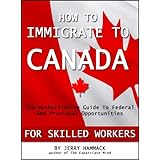Pick an analogy: The Dating Game, match.com, e-Harmony...The CIC's proposed next step in modifying the economic immigration stream, the "Expression of Interest" program feels like a bad date just waiting to happen.
Here's the CIC explanation:
A major next step in building a fast and flexible immigration system will be the creation of a pool of skilled workers ready to begin employment in Canada, a commitment made in Economic Action Plan 2012.
Inspired by an approach developed by New Zealand – and now also being used in Australia – an Expression of Interest application system is the model the Government of Canada plans to use to create this pool of skilled workers.
Under an Expression of Interest system – or EOI – prospective immigrants fill in an online form indicating their “interest” in coming to a host country as permanent residents. The form can include information that relates to, for example, language proficiency, work experience and assessed education credentials.
Assigned a points score and ranked, these expressions of interest would then be entered into a pool from which candidates that best match a country’s national and regional skills needs can be drawn and invited to submit an immigration application, subject to priority processing.
In effect, the EOI form submitted by a prospective immigrant is not an application itself but only a first stage in the assessment of a potential candidate. Not all candidates who file an expression of interest are invited to apply for a permanent resident visa.
Consultations with provinces, territories and stakeholders on the development of an EOI system for Canada are underway. Of interest to CIC is the potential for a larger role for employers in the immigration program, leveraged through EOI.
As part of ongoing consultations, CIC has held roundtables with employers in a number of cities to discuss how such a system could help meet employer needs. A report on these recent discussions will be available on the consultations section of the CIC website soon.
With the elimination of the Federal Skilled Worker backlog, CIC anticipates being able to move to an EOI system that will: avoid the build-up of inventories and improve processing times; and make the immigration system more responsive to labour market needs and increase the likelihood of skilled immigrants’ success.
So, you're a potential immigrant: you put your name into the program by spending some money on things like proof of language proficiency and credentials (components of the current Skilled Worker program), let the program know your skills, and then? You wait. You wait, passively, until some employer or recruiter spots you out of the thousands of others who will put their names into the pool.
I don't know many economic immigrants who are passive by nature - do you? Was it passive immigrants that settled the prairies? That built the railroads? That mined the coal? That squeezed the tar sands? Will they wait for Canada, or take their skills to a country more willing to accept them?
The government says that they will identify candidates that "best match a country’s national and regional skills needs", but if you think the Tories who are designing this program are going to bring more individuals in who don't have jobs lined up, you haven't been paying attention to the immigration issues in Canada.
So, you're a potential employer: are you going to really shop for a new employee from this pool? Or are you going to use your regular recruitment methods? After the ruthless elimination of the Skilled Worker backlog, the "fast track" will be the standard track for Skilled Worker candidates. As it stands, a job offer in Canada puts you at the head of the queue.
This dating game is stacked in favour of no one. In my opinion, immigrants wont benefit, and employers wont use it. It's a shell game for the uninformed. It gives the impression that economic immigrants will have a better chance at success if they come into the country through it. What do you think the real impact of the program will be?


